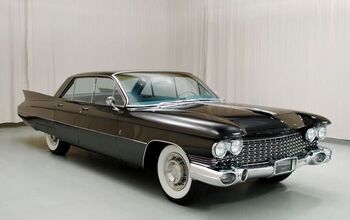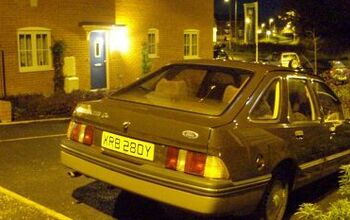The Six People You Meet In the Car Business

I spent 33 years in the automobile business, the equivalent of 96 human years. Having worked for car dealerships, manufacturers, an auction house, and an auto finance company, I’m convinced there is no other industry that attracts such a diverse cast of characters. Many of them defied stereotypes: I met car sales people who were honest, ethical and hardworking. I also worked with senior executives of well-respected automobile companies who were total sleazebags.
Throughout the years, I kept meeting the same set of six people over and over. These are their stories. Their names have been changed to protect the guilty.
1. The rock star car salesperson who gets fired everywhere he works.
I first met “Perry” at a Honda dealership in Louisiana in 1986. A rotund enthusiastic person, Perry was one of the best sales people I’d ever seen. Stick him on any showroom floor and he would move 20 cars per month, every month. Customers absolutely adored him.
Perry would never last long at a store because he possessed an ability to piss off every one of his co-workers and managers. I’m not talking about the normal jealously by other sales people here. I’m talking about mild-mannered employees running into their general manager’s office and screaming, “Either Perry goes or I go!”
Perry was fired from one job shortly after he sold a car and took the deal into the F&I office and told the long-time finance director, “Don’t fuck this up!”
The car business being a small, inbred industry would result in me bumping into Perry several more times, once while he was selling Mercedes-Benz vehicles in Texas in 2003. I last heard he was at a luxury car dealership in Arizona in 2014.
2. The rock star car salesperson who should get fired, but doesn’t.
A fellow we’ll call “Reed” is a top salesperson at a West Coast dealership and is as big a pain in the ass to his peers as Perry. When his company opened a second same-franchise location across town, it was policy that there would be no cross-selling by sales people. Reed threatened to quit unless he was allowed to work customers at both stores and dealership management relented.
When Reed’s manager moaned to a management consultant that he could not terminate the prima donna “because he sells 30 cars a month,” the consultant responded, “You have two choices. Fire him and hire two salespeople who can each sell 15 cars per month or hire three who can each sell 10 a month.”
Reed is still employed there.
3. The dealership owners who know everything about the car business except what’s going on inside their own stores.
As an Automotive News junkie, I loved talking about the car biz with these dealer principals. They may only own a Chrysler franchise but can talk at length about what is going on at BMW and Toyota. Still, they’re a little hazy when asked about their salespeople’s incentive plans. These types like to volunteer to be on manufacturer’s dealer advisory boards. They also tend to have time-consuming high-dollar hobbies, be it a Beechcraft, boat or blackjack.
The problem is that there is a relationship between this type of mentally absent owner and employee theft. It sometimes seem like automobile dealers are the easiest companies to steal from. Recent stories about millions of dollars in employee embezzlement can be found here and here and here.
I was once calling on such a dealer principal when he discovered that his lowly lot attendant supervisor had swiped $1.1 million dollars from his store by creating and submitting phony time cards to the accounting office. Curiously, in this case and most of the others, it seemed the managers who should have caught the capers were never terminated.
I wonder if this dealer principal told the FBI when they were investigating the case, “Yeah, but I just read in ‘WardsAuto Dealer’ about the Chevy store in Buffalo who lost two million dollars to their title clerk … ”
4. The sleazy general managers of publicly held dealerships
The rise of large, publicly held dealer groups — like Penske, Group 1 and Sonic — has not been looked upon kindly by car companies. Automakers want their franchised dealers to have an owner on the premises, someone who can solve customer issues face-to-face, which does not happen with the “publics.” Instead, each store has a revolving door of general managers, whose “owner” — the dealer group’s headquarters — is typically hundreds of miles away. This can lead to problems.
Let’s use one group as an example: an anonymous dealer group that sells autos all over the nation. I have called on five of its dealerships. This public was without peer when it came to dirtbag general managers.
Let’s start with a high-line GM we will call “Duck.” Despite me being a supposed expert on the subject of corruption in the car business, he taught me a new trick. While attending a golf tournament put on by his captive finance bank, Duck thought he would curry the bank’s favor in hopes of them approving more of his credit-challenged customers. He proceeded to slip $1,000 in cash into the gym bag of one of the bank’s credit analysts. The analyst reported the attempted bribe, but nothing came of it as Duck was later promoted to a Regional Manager of the dealer group.
In another case, an automotive finance company hired one of the auto group’s Regional Finance Managers and terminated him three weeks later because it turned out he a was a serial sexual harasser, and by all accounts his former employer turned a blind eye to his activities.
The topper was the general manager in the group whose auto manufacturer awarded him a free trip to the Masters golf tournament. Like a lot of Masters corporate attendees, he was housed in a luxury private home, which he and his guest proceeded to trash after a night of drinking. As you might have guessed by now, he kept his job.
Want job security in the car business? Join a publicly held dealer group.
5. The car company sales executive who has zero enthusiasm for cars
When I was hired by the sales division of American Honda, I assumed I’d be joining a colony of car nuts like myself.
I was wrong.
Naturally, my peers all possessed great enthusiasm and product knowledge about Honda vehicles, but there were very few true automobile aficionados among them. The good thing about Honda was their motorcycle division folks were all gearheads and a high percentage of the engineering staff had something interesting parked in their garages. I’d later learn this phenomenon is common at most automobile companies.
I experienced an exception to this rule during the time my employer Mercedes-Benz owned Chrysler. We attended a meeting at DaimlerChrysler headquarters in Detroit on the day of its annual employee car show. There were a couple hundred vintage Chrysler cars on display, from Chargers and SuperBirds to Valiants and Belvederes. Some of their old timers showed pristine American Motors vehicles. We also toured the now-defunct Walter P. Chrysler Museum, but it did not compare to the employee extravaganza.
There were some serious automobile enthusiasts at Chrysler back then.
6. The dealership owners who take wonderful care of their employees and customers
These folks at Newton Nissan of Gallatin, Tennessee, are celebrating being named “#1 Nissan Dealer in America” in 2017 for the second consecutive year by shoppers on customer satisfaction website DealerRater. I don’t know this store, but I guarantee it’s a great place to work.
There is no question that happy employees make for happy customers.
I know one Midwest store where the owner takes his managers on quarterly trips, be it to the Final Four basketball tourney, Cabo or just renting out a local restaurant. Needless to say that dealer has low employee turnover, high customer satisfaction ratings and makes a ton of money.
I have worked with numerous such stores, but they sadly only represent about 15 percent of the U.S. dealer body. The rest are content with high turnover, particularly among salespeople, and their managers make a sport out of cutting pay plans. (And with the right franchise and/or location, it is easy to see why. If the dealership is profiting a couple million dollars a year, owners feel there’s no need for any strategy to attract and keep top-notch employees.)
There’s a crisis brewing in the car business of dealers not being able to find qualified technicians to go along with the continuing challenge of attracting good salespeople. In addition, new car sales are forecasted to fall from their current torrent pace. The result of all this will be a widening gap in sales and profitability between the dealerships who have coddled their team members and guests over the years and those who have not.
And, like in the last recession, some of those dealerships will not survive.
[Image: Prostock-studio/Shutterstock.com]
Become a TTAC insider. Get the latest news, features, TTAC takes, and everything else that gets to the truth about cars first by subscribing to our newsletter.

More by Steve Lynch
Latest Car Reviews
Read moreLatest Product Reviews
Read moreRecent Comments
- Pau65792686 I think there is a need for more sedans. Some people would rather drive a car over SUV’s or CUV’s. If Honda and Toyota can do it why not American brands. We need more affordable sedans.
- Tassos Obsolete relic is NOT a used car.It might have attracted some buyers in ITS DAY, 1985, 40 years ago, but NOT today, unless you are a damned fool.
- Stan Reither Jr. Part throttle efficiency was mentioned earlier in a postThis type of reciprocating engine opens the door to achieve(slightly) variable stroke which would provide variable mechanical compression ratio adjustments for high vacuum (light load) or boost(power) conditions IMO
- Joe65688619 Keep in mind some of these suppliers are not just supplying parts, but assembled components (easy example is transmissions). But there are far more, and the more they are electronically connected and integrated with rest of the platform the more complex to design, engineer, and manufacture. Most contract manufacturers don't make a lot of money in the design and engineering space because their customers to that. Commodity components can be sourced anywhere, but there are only a handful of contract manufacturers (usually diversified companies that build all kinds of stuff for other brands) can engineer and build the more complex components, especially with electronics. Every single new car I've purchased in the last few years has had some sort of electronic component issue: Infinti (battery drain caused by software bug and poorly grounded wires), Acura (radio hiss, pops, burps, dash and infotainment screens occasionally throw errors and the ignition must be killed to reboot them, voice nav, whether using the car's system or CarPlay can't seem to make up its mind as to which speakers to use and how loud, even using the same app on the same trip - I almost jumped in my seat once), GMC drivetrain EMF causing a whine in the speakers that even when "off" that phased with engine RPM), Nissan (didn't have issues until 120K miles, but occassionally blew fuses for interior components - likely not a manufacturing defect other than a short developed somewhere, but on a high-mileage car that was mechanically sound was too expensive to fix (a lot of trial and error and tracing connections = labor costs). What I suspect will happen is that only the largest commodity suppliers that can really leverage their supply chain will remain, and for the more complex components (think bumper assemblies or the electronics for them supporting all kinds of sensors) will likley consolidate to a handful of manufacturers who may eventually specialize in what they produce. This is part of the reason why seemingly minor crashes cost so much - an auto brand does nst have the parts on hand to replace an integrated sensor , nor the expertice as they never built them, but bought them). And their suppliers, in attempt to cut costs, build them in way that is cheap to manufacture (not necessarily poorly bulit) but difficult to replace without swapping entire assemblies or units).I've love to see an article on repair costs and how those are impacting insurance rates. You almost need gap insurance now because of how quickly cars depreciate yet remain expensive to fix (orders more to originally build, in some cases). No way I would buy a CyberTruck - don't want one, but if I did, this would stop me. And it's not just EVs.
- Joe65688619 I agree there should be more sedans, but recognize the trend. There's still a market for performance oriented-drivers. IMHO a low budget sedan will always be outsold by a low budget SUV. But a sports sedan, or a well executed mid-level sedan (the Accord and Camry) work. Smaller market for large sedans except I think for an older population. What I'm hoping to see is some consolidation across brands - the TLX for example is not selling well, but if it was offered only in the up-level configurations it would not be competing with it's Honda sibling. I know that makes the market smaller and niche, but that was the original purpose of the "luxury" brands - badge-engineering an existing platform at a relatively lower cost than a different car and sell it with a higher margin for buyers willing and able to pay for them. Also creates some "brand cachet." But smart buyers know that simple badging and slightly better interiors are usually not worth the cost. Put the innovative tech in the higher-end brands first, differentiate they drivetrain so it's "better" (the RDX sells well for Acura, same motor and tranmission, added turbo which makes a notable difference compared to the CRV). The sedan in many Western European countries is the "family car" as opposed to micro and compact crossovers (which still sell big, but can usually seat no more than a compact sedan).


































Comments
Join the conversation
Rich Corinthian Leather
Worked my way through 2 years of college selling Mazda's and all Honda products except cars. This was early '80s in a relatively small town. Myself and 3 others, 1 female who was attractive, friendly and pretty ethical, but new little about cars and less about math. One guy was an old-timer, super nice grandfatherly type, moved at his own pace, had been there awhile and had built a small but loyal clientele who would refer others to him. The third was a real lick, late middle age, smug, knew next to nothing about product and was proud of it. I took the job to be the motorcycle guy but in the day Mazda had the Gen 1 RX-7 that was still popular, the GLC that was cheap and the B2000 pick up that was advertised in base version at $5995. Those things flew out the door which was good because I thing there was about $200 in the deal if you couldn't talk the customer into a $249 step bumper or the $800 dealer installed A/C. Most people declined and drove out with the stripper. I was the only real car guy and while the Mazda line-up was generally a good one, they were a fringe brand in a small market and I had more fun selling and demoing bikes. But the new FWD 626 came out and I really loved them. Daily we'd have customers seeing the Honda sign and come in looking for an Accord. At first I'd explain what we had and try to show them a 626. Eventually I stopped explaining and just showed them the car, typically a LX trim. If I could get them to drive it, about half eventually bought a Mazda after getting horrible treatment and crazy pricing at the Honda dealer. I learned a lot about sales, even more about cars and a tremendous amount about people and leadership. A great 2 years.